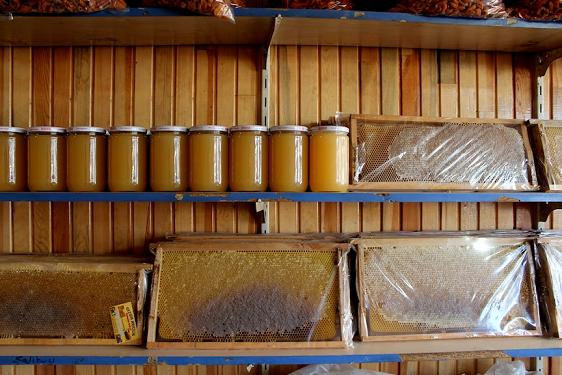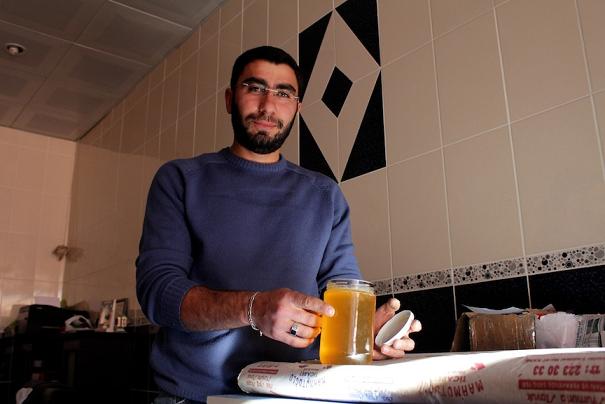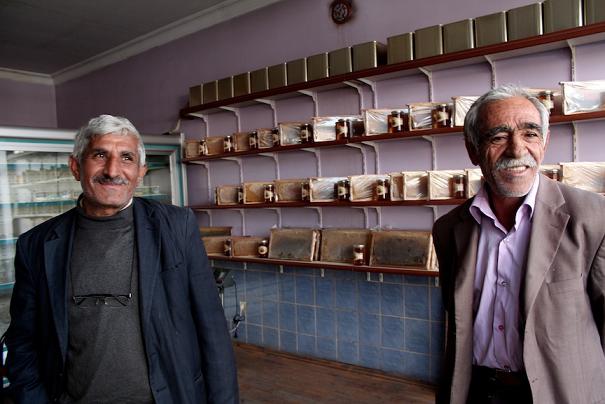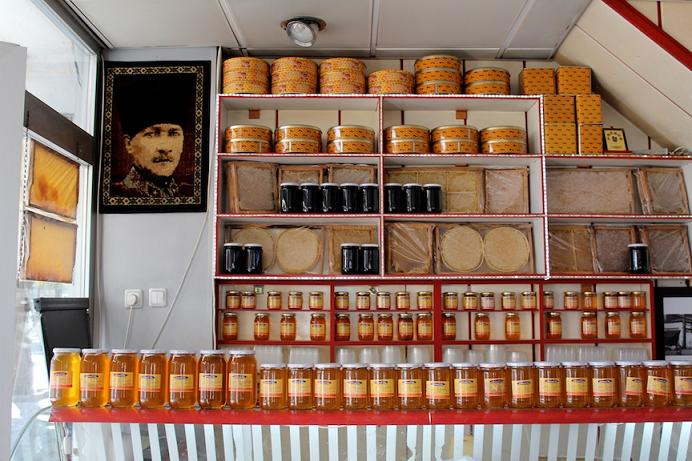In a guest post on the Cornucopia blog, Claire Bangser from the Balyolu team explores the sweeter side of Kars, a border town in far-eastern Turkey, famously portrayed as cold and bleak in Orhan Pamuk's novel 'Snow'.
In a village in northeastern Turkey, a bee-keeper died this spring at the age of 115. His diet consisted exclusively of honey. When I try to imagine what this would be like, I picture an old man with sticky blood and rotten teeth. I imagine this man possesses secret and sacred communication pathways with his bees.
Tempting as that sounds, I'm not quite ready to embark on a 115-year honey regimen, but I decided to take on a honey-binge of my own, a Tour de Bal around my 'home base' city of Kars. I've come in and out of Kars over the past three months as part of a National Geographic Young Explorer's research expedition examining food, culture and politics in northeast Turkey and the south Caucasus through the lens of honey and age-old bee-keeping practices. The expedition leader, Cat Jaffee, and I have spent most of this time travelling across the region – dipping our pide into bowls of home-harvested honey among a blue-eyed bee-keeper's colourful lakeside hives in Cildir, sinking our teeth into melt-in-your-mouth wax combs in the forested mountains of Georgian Macahel, moving hives under the cloak of darkness across the flower-speckled middle of nowhere in Azerbaijan, and devouring dollops of throat-squeezing creamed honey on cucumbers from the backyard hives of a rural Armenian fireball.
Kars, urban as it may be, has a honey culture of its own. With a population of just 77,000 (only 40,000 in the summer), Kars has over 65 cheese and honey shops. If you applied that ratio to New York City there would be 1.35 honey and cheese shops for every two square blocks. Let's make sure we're clear here. These aren't stores that sell a bunch of things including cheese and honey; they are shops dedicated exclusively to these two culinary staples alone.

In the spirit of the Caucasus – where it seems to me that everything is extreme (driving, food, moustaches, hospitality, love, the weather, the sea...), I decide to attempt a tour all of Kars's honey and cheese shops in one day. Equipped with my camera, sweet tooth, and new-found Turkish skills, I tuck into my pocket a handful of questions: how will Kars honey compare to the wide range of honeys I've consumed in the past three months? Will the honey shopkeepers be as knowledgeable as the bee-keepers we met (and will their moustaches be as great)? What will honey-tasting teach me more broadly about this fair city? And my last question, a personal one: will I survive a whole day of eating only honey? I lick my lips and set out on foot.
I begin by winding through back roads – off towards a more residential side of town, where I don't usually go. Could there be small honey and cheese shops scattered in back alleys on the far side of town? I walk for a long time and find only one. Hos geldiniz! a 40-something man welcomes me enthusiastically as he carefully folds patterned paper around a block of Gravier cheese for a patient customer. I ask if it's okay to take pictures and this piques his curiosity. 'Take! take!' He grabs a jar of his own honey from the shelf behind him and cleans off a spoon. 'Here,' he says 'try this.' I dip the spoon into the jar and lift it slowly up to eye level to see if there will be a long string below or a quick broken drip. String. Good. I twirl the spoon and then hold it up to the light. The honey moves lethargically toward my hand. I wait to see how long it will take to drip. It doesn't drip. Good. I bring it to my nose. The smell doesn't move me one way or the other, so I wrap my lips around the honey and squeeze it onto my tongue. I let it mingle with my taste buds and then write down a few notes: thick, tasteless, not sweet. 'It's... interesting,' I say. When I ask who the bee-keeper is and where he's from, the man pauses to think and then states unconvincingly, 'I don't know. Well, the honey is from Kars. Hasan, the bee-keeper is... Hasan.'

My path wraps me around old stone ruins sprouting grass and tall pink apartment complexes criss-crossed with laundry lines. I pass government buildings and flocks of sheep, old men on bicycles and women carrying heavy bags like balanced scales. My next find is closer to town, a narrow store-front with a bright orange awning that proudly proclaims Kars Peynircisi – the cheese-monger of Kars. Inside, a well-moustached man welcomes me with eyes that wrinkle upwards. His name is Ekrem and he is more than eager to offer me the many flavours of his life's labour – honey, fresh local cheese, and pekmez, a sweet fruit reduction made locally by women in Kars. Slipping a bite of his karakovan honey onto my tongue, my mouth explodes with flavour. It is an amber honey that releases a thick, woody flavour. It transforms as it moves down my throat into a complex, bitter honey with just the slightest hint of sweet. I love it. Actually, I love all the food he gives me. It doesn't surprise me that he can rattle off information about the bee-keeper like the guy is his best friend.
Over the course of the day I visit a grand total of 36 cheese and honey shops – not all that Kars has to offer, but certainly enough to transform my body into a hyper, jittery, hot-flushing, camera-snapping, local attraction. In one day I collected an encyclopedia of flavours, a pocketful of business cards, nearly 500 photos, and countless facial-hair-savvy old man friends.

It's no coincidence that the Kars honey market is so robust. People here eat honey by the kilo. The region is widely believed to be the birthplace of the Caucasian bee, the bee sub-species with the longest tongue, which allows it to drink nectar from even the deepest of the region's 500 endemic wildflower species. In the summer months migratory bee-keepers from around Turkey come to the Kars region to reap the benefits of its floral diversity, drastic altitude differentiation, and vast untainted open spaces (Monsanto hasn't made it out here yet).
That doesn't mean the region is without problems. This year was one of the worst honey seasons in its history, due to volatile climate conditions including spring flooding and unprecedented snow in July, which drastically shortened the flower season. On our travels here we met bee-keepers who literally harvested zero honey this year, as well as some who had decided to feed their bees more sugar than the normal early-season dose so they would be able to sustain production. Despite the poor season most of the honey shops in Kars seemed well stocked, and only two were unwilling to open a jar to let me taste the product.
Over the past few months of travelling with Balyolu we've explored honey production from its deepest roots, holding a magnifying glass to the ancient practices that have informed the methods of bee-keepers today. We've been up close and personal with Caucasian bees for hours on end, opening bee boxes and swallowing honey combs, wax and all. We've eaten in the homes and shaken the swollen hands of the men and women who devote their lives to understanding these little creatures, and we've even camped in a field full of hives, in a bed made of bee boxes.
With sugar coursing through my blood I was able to explore the last part of the food cycle, from the middle-man to the consumer, and I came to see that this part carried a weight of its own. That flavours from throughout the region are brought together here, for the touring foodie's delight. Not everyone has the good fortune to eat honey straight from the hive.

More than anything, touring Kars through the lens of honey opened a door to the city's underbelly – drawing me into the wise words of women shopkeepers and the conversations of men drinking tea in the middle of the day, unleashing local perceptions of food, environment, culture and politics that accompany honey production here and across the world. Plus, there really were some great moustaches.
As Cat Jaffee has asserted time and again, tourism through niche food industries is a gateway to understanding a place and a culture more intimately while supporting its culinary traditions. If you ever find yourself stranded in Kars, I recommend you fire up your sweet tooth and go honey-shop hopping. It might not be an everyday activity, but I think some part of the experience will stick in your blood well into your hundreds.
There are more photos from Claire's honey-and-cheese-shop crawl on her own blog
For more informantion about Cat Jaffee and the Balyolu project – including details of how to join an adventurous tasting tour of Turkey's finest bee country – visit www.balyolu.com